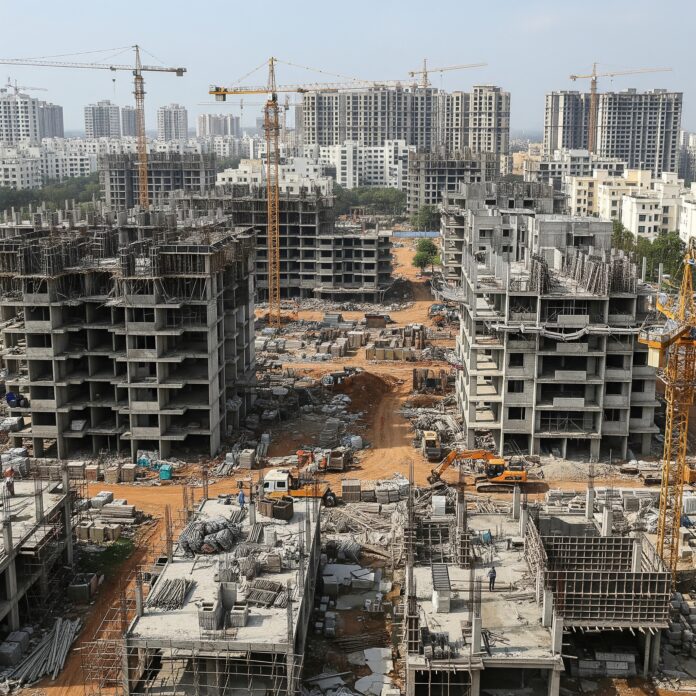BENGALURU, India – The Karnataka Real Estate Regulatory Authority (K-RERA), established to bring transparency and accountability to the state’s burgeoning real estate sector, is facing mounting criticism as a significant number of residential projects remain incomplete, leaving thousands of homebuyers in a state of financial uncertainty. Recent data and expert opinions paint a concerning picture of regulatory enforcement and its impact on consumers.
Widespread Delays and Defaults Revealed
According to the latest figures from K-RERA, a staggering 2,632 out of 7,707 registered projects have seen their developers fail to meet committed deadlines, with delayed flat delivery being the primary grievance. This translates to over 2,600 projects officially marked as ‘expired’ and more than 2,700 classified as ‘lapsed.’ An ‘expired’ project signifies that its registration period has concluded without the builder seeking an extension, while a ‘lapsed’ project indicates incompleteness without renewal. In both instances, the project’s registration becomes invalid, exposing developers to potential penalties and regulatory action. Notably, none of the defaulting builders reportedly applied for extensions within the stipulated timeframes.
RERA’s Mandate vs. Reality
The Real Estate (Regulation and Development) Act (RERA) mandates strict adherence to transparency and timelines. Developers are required to declare project completion dates in agreements with buyers and must upload quarterly project status updates, including financial details, to the K-RERA portal. Non-compliance can lead to penalties of up to 10% of the project cost, with authorities empowered to attach promoters’ assets to recover dues and compensation for buyers. Furthermore, RERA stipulates that 70% of project funds collected from homebuyers must be deposited into a separate escrow account, to be used solely for that project’s construction and land costs, preventing fund diversion.
However, the effectiveness of K-RERA’s enforcement has been widely questioned. Rajagopalan R, convener of the Bengaluru Coalition group, a body dedicated to fighting illegal constructions, highlighted the stark disparity between ordered and recovered amounts. “The body has been largely ineffective, recovering barely Rs 100 crore of the Rs 1,000 crore ordered from errant builders,” he stated, a figure corroborated by reports indicating that as of December 31, 2024, K-RERA had only recovered approximately Rs 92 crore out of Rs 758 crore in recovery orders issued against 278 builders. This represents a recovery rate of merely 12-14%.
Homebuyers in Limbo: A “Broken System”
The prolonged delays and ineffective recovery mechanisms have caused immense distress among homebuyers. Dhananjaya Padmanabhachar, convener of the Karnataka Home Buyers’ Forum, expressed deep concern over the authority’s perceived inaction. “If a Rera registration lapses, it is the promoter’s duty to renew it — buyers’ rights remain protected under Rera regardless. Yet, even after eight years, Karnataka Rera has failed to deliver justice or issue clear guidelines for project closures,” he asserted.
A critical point of contention is the reported absence of a clear project closure policy in Karnataka, a stark contrast to other states like Odisha, which have implemented comprehensive frameworks. Homebuyers have actively urged K-RERA to adopt a similar model, which would require developers to submit various documents, including Completion Certificates, Occupancy Certificates, and proof of formation of residents’ associations and transfer of common areas, before a project is officially closed. An RTI response from March 2025 confirmed that K-RERA is “considering” a project closure policy, but no official guidelines have been released.
The lack of enforcement is further compounded by the fact that the implementation of RERA orders often rests with the revenue department, which, according to Padmanabhachar, “fails to act.” This bureaucratic hurdle leaves homebuyers with limited recourse, forcing many to pursue legal avenues through consumer forums and high courts. The financial burden on affected families is significant, as they are often left juggling both EMIs for their undelivered homes and rental expenses.
Despite the robust legislative intent of the RERA Act, the ground reality in Karnataka suggests that poor execution continues to undermine its protective measures for homebuyers, even as the broader real estate market experiences a “bull run.” The ongoing challenges highlight the urgent need for more stringent enforcement, greater transparency, and clear guidelines to ensure justice for those who have invested their life savings in the dream of homeownership.

